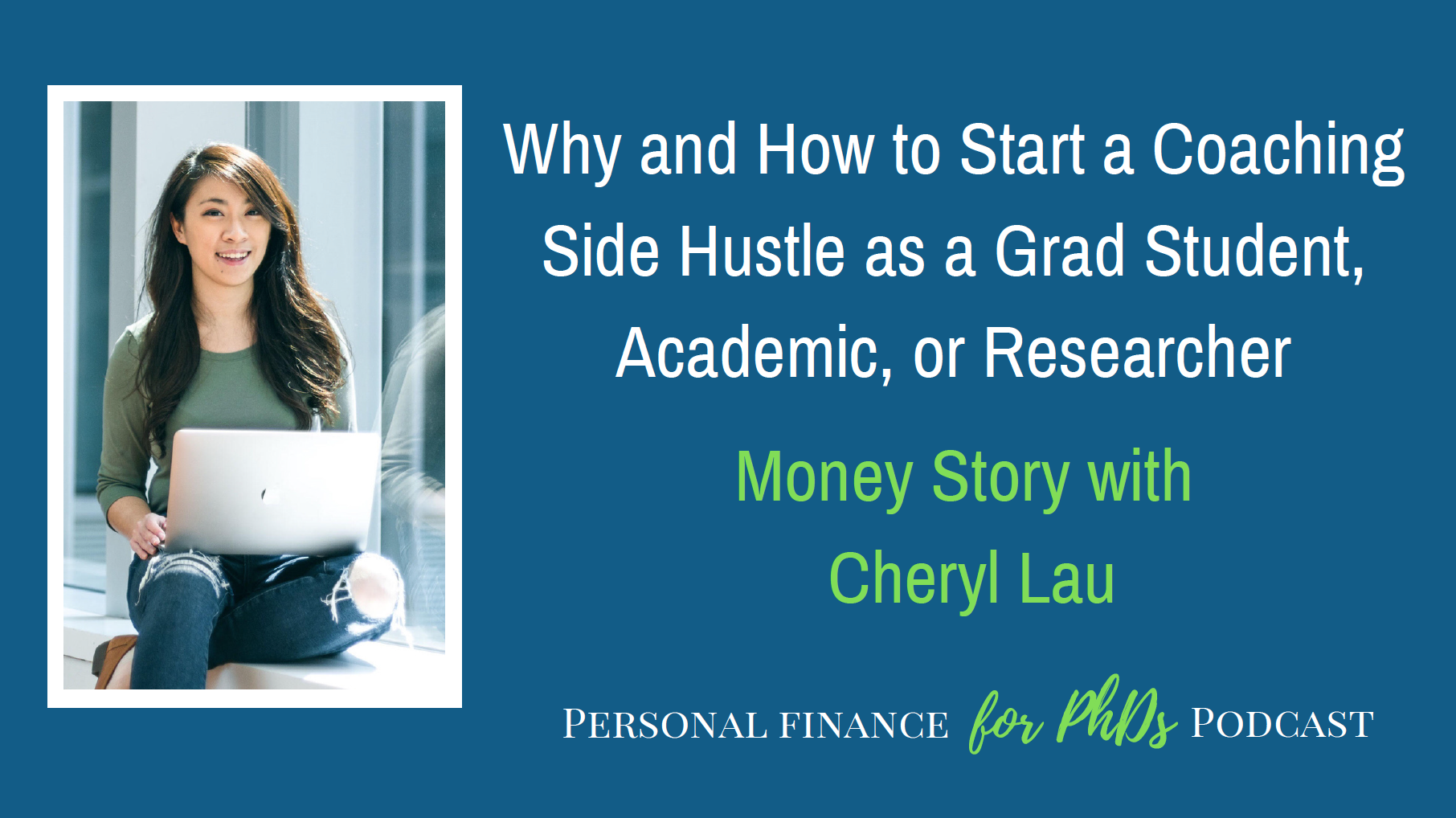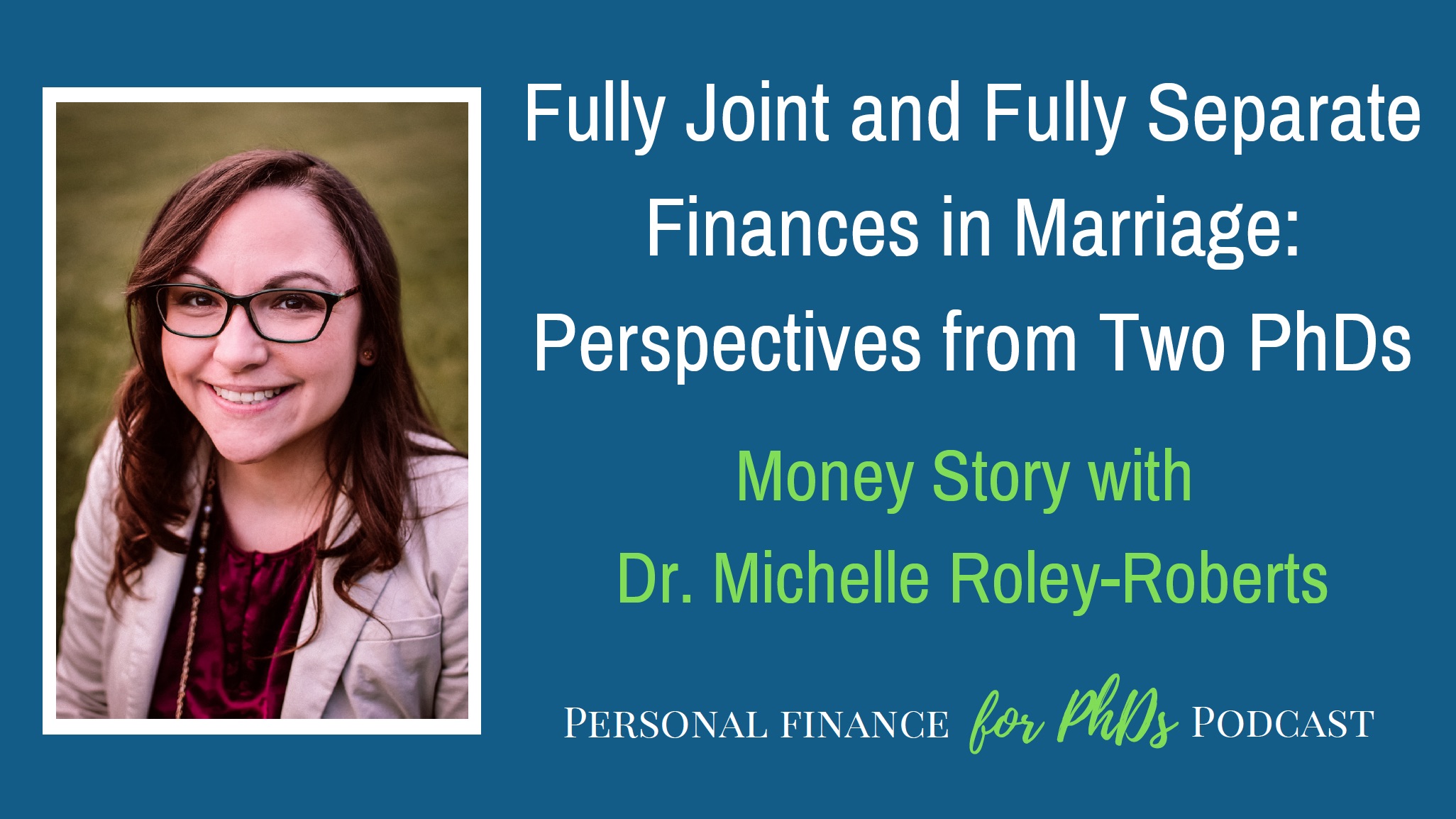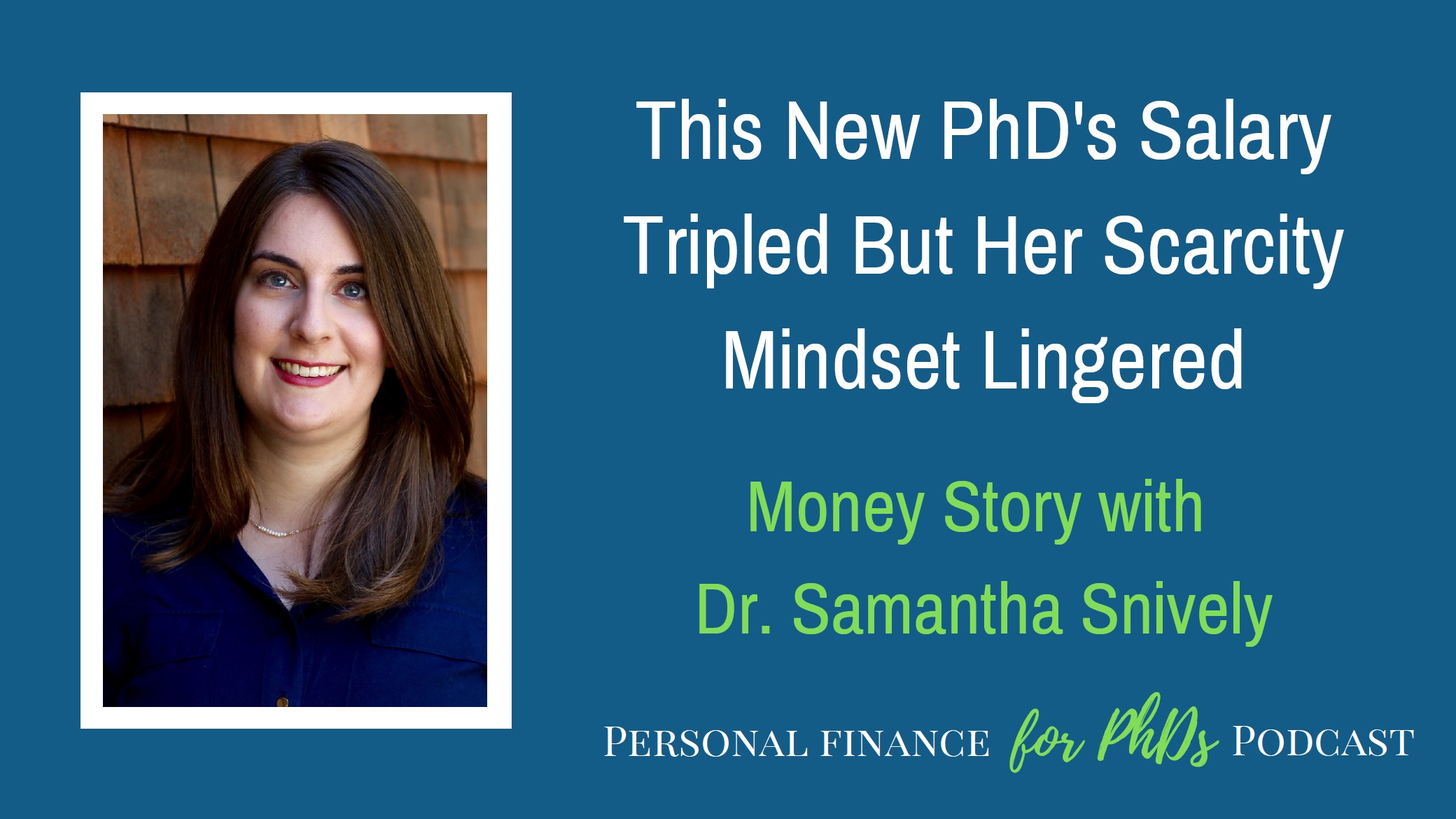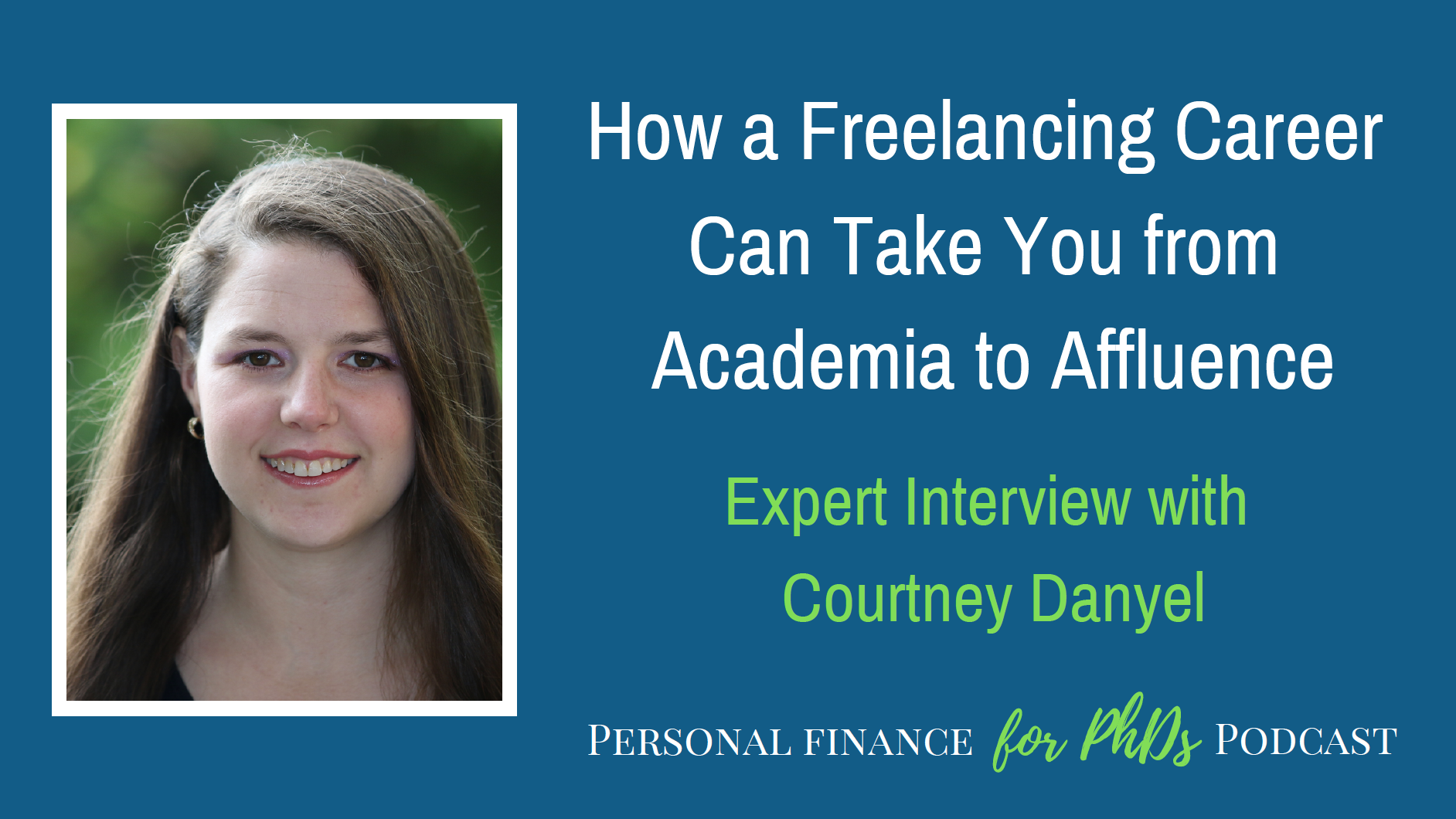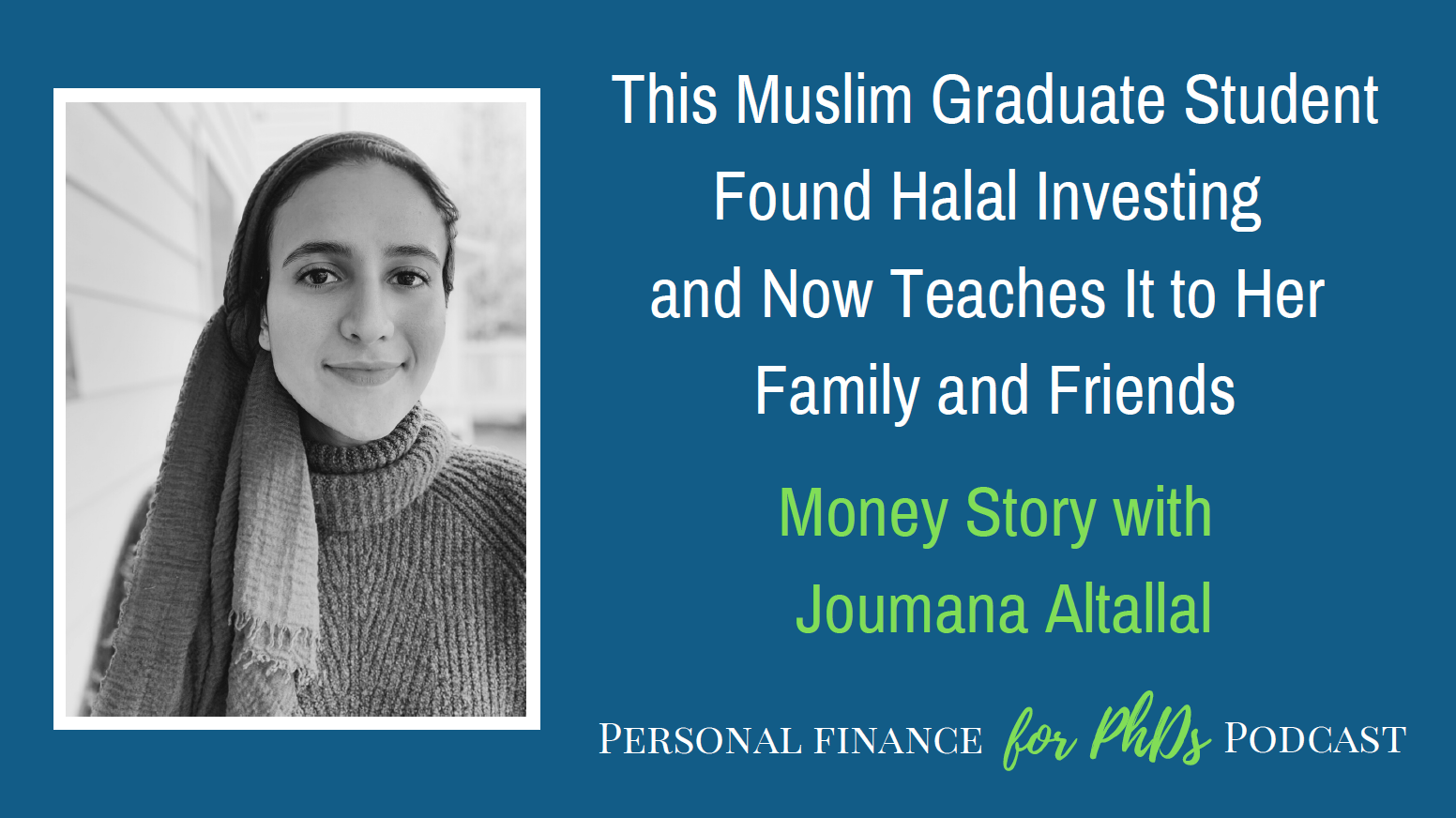In this episode, Emily interviews an anonymous member of the Personal Finance for PhDs Community and alum of The Wealthy PhD. Anonymous did a summer internship at Google Research, which helped her evaluate whether she wants to pursue a career in academia or industry and set her up well for an industry career. The internship also paid her in three months approximately what she makes in an entire year on her grad student stipend. Anonymous shares her tips for applying to Google’s summer internship program and convincing your PhD advisor to let you do the program. The sudden but temporary increase in Anonymous’s income spurred her to participate in The Wealthy PhD, through which she opened and maxed out an IRA, optimized her financial accounts, and started tracking and budgeting her expenses.
Links Mentioned in the Episode
- PF for PhDs: The Wealthy PhD
- PF for PhDs: Community
- Christine Mirzayan Science Technology Policy Graduate Fellowship Program
- Leet Code Website
- Cracking the Coding Interview (Book)
- PF for PhDs: Graduate Student Savings Act Episode
- PF for PhDs: Fellowship Income Now Eligible for IRA Contribution
- PF for PhDs: Podcast Hub
- PF for PhDs: Subscribe
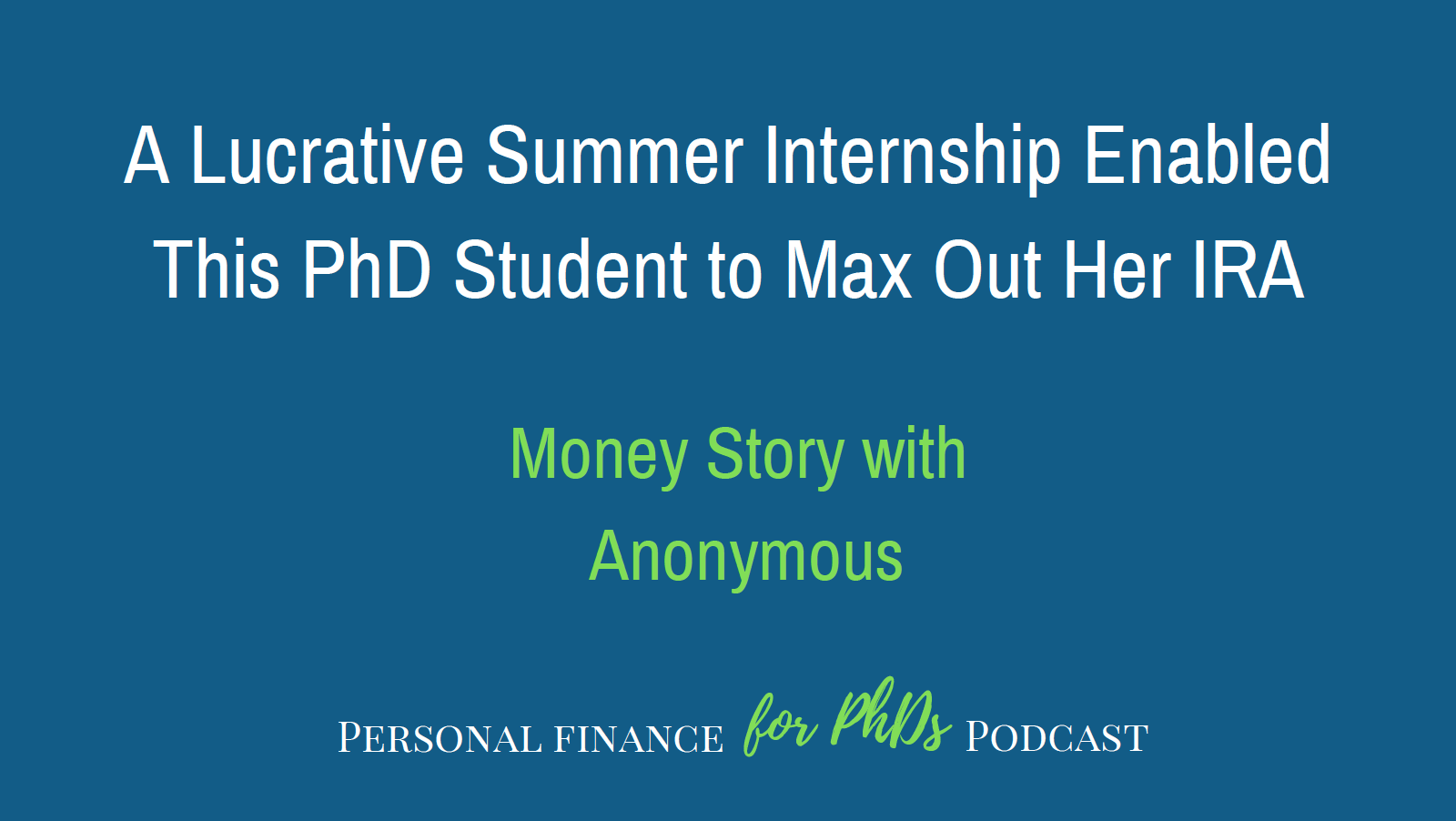
Teaser
00:00 Anonymous: Kind of talking about how much you earn, or like, how much money you have in your bank account can be an uncomfortable topic. So, having a safe space, or a kind of required space, to be open about your finances and listen to other people’s ideas. I think having this community was really empowering for me.
Introduction
00:26 Emily: Welcome to the Personal Finance for PhDs podcast, a higher education in personal finance. I’m your host, Dr. Emily Roberts. This is season seven, episode seven, and today my guest is an anonymous member of the Personal Finance for PhDs Community and alumna of The Wealthy PhD. Anonymous did a summer internship at Google Research, which helped her to evaluate whether she wants to pursue a career in academia or industry and set her up well for an industry career. The internship also paid her in three months approximately what she makes in an entire year on her grad student stipend. Anonymous shares her tips for applying to Google’s summer internship program and convincing your PhD advisor to let you do the program. The sudden, but temporary increase in Anonymous’s income spurred her to participate in The Wealthy PhD, through which she opened and maxed out an IRA, optimized her financial accounts, and started tracking and budgeting her expenses.
01:23 Emily: The Wealthy PhD is my signature program that delivers financial inspiration, accountability, and actionable knowledge. Through one-on-one coaching sessions, I help each participant to identify at least one overarching goal that they would like to achieve during the program and map out the necessary steps. I also lead weekly accountability meetings with small groups of participants during which you will set and report on small weekly goals and also receive help overcoming any obstacles you’re facing. It’s an intensive and highly transformative experience. The next cycle of The Wealthy PhD will take place in early 2021. You can find out more at pfforphds.com/wealthyPhD. In the meantime, the Personal Finance for PhDs Community is available for you. The Community comprises many financial education resources I’ve created, including the ebook, The Wealthy PhD. The Community is a self-directed experience. However, I am always available to provide assistance and personalized feedback to you through the Community forum and monthly live calls. We also have monthly challenges and a book club. A benefit I recently added is that you are invited to sit in on my podcast interviews and ask your own questions of my guests. You can learn more about the Community and join anytime through pfforphds.community. Without further ado, here’s my interview with Anonymous.
Will You Please Introduce Yourself Further?
02:31 Emily: I have a really special guest joining me on the podcast today. She is a member of the Personal Finance for PhDs Community, and she is also an alum of my Wealthy PhD program. So, we’ve been working together for a few months now. She is actually choosing to remain anonymous for this episode. So, I won’t use her name, but I will let her introduce herself to you in just a second. And we are going to be talking about the wonderful, lucrative internship that she did just this last summer, summer of 2020 with Google and how she got the internship and what it’s done for her finances. So, super excited about this. This is a great one to listen to if you are considering whether or not you should do an internship during your PhD program. What are the pluses and minuses? We’ll be talking about all of that. So, welcome, and will you please introduce yourself?
03:42 Anonymous: Yeah. Great to be here. So, hi I’m Anonymous and I’m a fourth-year PhD candidate studying electrical engineering and computer science, or EECS. Actually, a fun fact about myself is that I actually studied Biomedical Engineering at UC Berkeley, where I went as my undergrad.
Google Research Summer Internship Experience
04:04 Emily: Yeah, good to know. I didn’t even realize that. So, we have that field in common, actually. Okay. So, I mentioned this last summer, you did an internship with Google. What was that type of internship and what do you think you got out of it? Professionally speaking?
04:19 Anonymous: So, the internship was my first industry experience. So, it was actually very valuable for me in and of itself to gain perspective on how research works in an industry setting versus academia. And during the internship, besides doing research, I tried to attend a few seminars which talked about industry versus academia. And there were some great workshops where professors slash research scientists, so people who lead a dual life of industry and academia, talked about their experiences. So, I tried to focus my experience on what would it be like if I were to get a job in industry.
05:00 Emily: Okay, so this was, you were thinking of it as actually kind of like a trial period in helping you decide which way to go in your career.
05:08 Anonymous: That’s right. Yeah. Since I switched my major from biomedical engineering to electrical engineering, before I wasn’t really thinking about industry as much as now. But having switched the major I noticed that a lot of people in my major would start doing internships after their third year or their fourth year. So, I really wanted to try something out to see if I would like it or not.
05:36 Emily: Okay. Yes. Let’s come back to that point in a moment, but I just wanted to hear more about did you actually learn anything new or was it more about you learning the setting and how things work in that setting? Or, yeah, just more about like, what did you get out of this internship?
05:51 Anonymous: So, this internship is actually a little bit special in the sense that it’s very research-focused. So, within Google, I was within Google Research. So, it’s not quite typical industry experience, I suppose. The setting was actually quite similar to how I would normally work with my PhD advisor.
Career Development Opportunities via Google Internship
06:14 Emily: And what about future career opportunities? You know, if you do decide that you want to go into industry instead of academia, you know, do you see the possibility of being hired at Google or at least would maybe your mentor be able to serve as a reference? Or what about sort of the furthering of your career?
06:30 Anonymous: Oh, definitely. So, I’m not sure about other companies, but at the end of my Google internship, I had the option to either return as another intern for next summer, or for those who are graduating within one or one and a half years, they had an option to do full-time position conversion internally. So, at a minimum, this is a great opportunity, I think, for me to get an internship opportunity back again, because I will not be graduating for another two years, so I’m not eligible for full-time conversion. But I think this is also kind of a good motivation for PhD students to do an internship either after their third year or their fourth year. So, I haven’t gotten a job yet, but I think this would also greatly help with the job search once you’re near the end of your PhD.
Why Should a PhD Student Consider an Internship?
07:23 Emily: Yeah, that sounds fantastic. So, both between your reasons and also maybe other people’s reasons, why should a PhD student consider doing an internship? Obviously, there are some programs like yours where it’s more culturally common to do internships. So, maybe speak to the people who are less familiar with why you would do an internship at all.
07:44 Anonymous: So, I think that you should try to keep your options open for those in the PhD. It’s still not late to get new experiences and decide what you would like to have in your career. So, if it’s something that you haven’t tried out before while we’re still in the program, I think that’s a great experience to get. And we will get to this aspect, but usually an internship helps greatly with your financial aspects compared to your graduate stipend. And that can be, I think that’s a wonderful motivator as well.
08:27 Emily: I see. I think the reason that you did this, especially, I think is a really great one is just kind of checking out the setting. Like, is this a place where I’d like to work compared to academia in helping people make their career decisions? I know that I did one, you could sort of call it an internship. It was, it was built more as a fellowship, but I did one three-month fellowship. It was actually after I finished my PhD, but it’s open to people who are not finished with graduate school yet, called the Christine Mirzayan Science and Technology Policy Fellowship at the National Academies. And from their like sort of conception of the fellowship program, it’s very clear that they’re not about like recruiting people to come work at the Academies. Like they’re about offering an experience in science policy to people who will, they always talk about it in thirds. About a third of them might go into careers in science policy.
09:13 Emily: A third of them will probably go back to academia and be, you know, faculty members or whatnot, or work in other roles within academia. And a third of them will go on to have other jobs. So, their purpose is just to give that experience away to people as sort of a way to tell them about what the National Academies are doing no matter what setting they end up in. So, at least that is billed as being very open. Like this is about career exploration and we’re happy to have people, you know, come participate in it for that purpose.
How Do You Discuss Internships with Your Advisor?
09:39 Emily: So, we said earlier that in your field, it’s a little bit more common to do internships, not unheard of. How did you navigate this conversation with your advisor of maybe, should I do an internship? What should the timing be? Is it okay with you? And how do I fit it in with the rest of my research plan?
09:57 Anonymous: I think the easiest way is to talk to your advisor early about, even if you’re a first year student, you probably have some careers aspirations that might change, and that’s totally fine. But try to have regular conversations with your advisor about what you might want to do after your PhD. And actually, your advisor can be the person who helps you get the internship. So, it’s not about getting his permission to do something outside of academic research, it’s working together to find something that works for both the advisor and yourself. And in my case, the research field that I was in while at Google Research, was not exactly my thesis topic, obviously. But it was in the same field of intersections between biology and artificial intelligence. So, I learned a lot of transferable skills in research that is actually helping me a lot right now that now that I’m back in PhD research. So, it’s a win-win in my case.
11:13 Emily: I think that’s a really smart approach to take in any negotiation is put yourself in the shoes of the person across the table from you and figure out what they want to hear and how this would benefit them. So, that’s awesome. You’re going to another setting, you’re learning something new and you’re able to bring back, you know, new ideas, fresh perspective, new insights to your existing resource and to your advisor. Hopefully, everyone can find some kind of connection between, you know, what they might be doing in an internship and how it can benefit their work or their advisor. At least try, that does sound like a great approach.
Tips for Being a Competitive Google Research Applicant
11:48 Emily: So, specifically talking about when you applied to Google Research. This is a fairly big program, right? Like, do you know how many people they accept every year?
12:01 Anonymous: I’m not sure, but probably across the world, there’s thousands of interns for summer.
12:06 Emily: Oh, wow. Is that at the undergraduate and graduate level?
12:10 Anonymous: I think so.
12:11 Emily: Okay. Yeah. So, quite a big program. What tips do you have about being a competitive applicant? Obviously, you were successful, but maybe you’ve learned even more since then about other commonalities that people who are successful in landing this internship.
12:25 Anonymous: Right. Yeah. So, I have some tips from myself and also something that I heard from a student. So, my specific role was software engineering intern. So,, it only applies to that position. Just FYI there are many types of internships within Google, not just software engineering. So, it’s going to be specific to that position. For this position, I had to do something called technical interviews, and I think that’s kind of unique to this one which requires some problem-solving related to data structures and algorithms. Thankfully this process is fairly common in other tech companies as well, not just in Google. And there are plenty of resources out there, too. There a standard interview book that everybody seems to use for this position and also a website called Leet Code to do practice problems.
13:20 Emily: What’s the title of that book?
13:22 Anonymous: The title of the book is Cracking the Coding Interview.
13:27 Emily: Okay. So, yeah, I’ll link to that from the show notes, as well as the website that you just mentioned.
13:33 Anonymous: Yeah. So the book is Cracking the Coding Interview, and the website is called Leet Code L E E T Code. So, I realize that this kind of technical interview might not be really common in other positions. And rather there might be more behavioral, quote unquote, behavioral questions. I think something common that other PhD students might need to do to get internship positions, not just software engineering, but other positions is explaining their research. And a great tip for this I heard is to try to prepare your research speech at three different levels. So, one level is for recruiters who know nothing about your field, the second level is for someone who is somewhat familiar, maybe you might know some terminologies, but not your specific research area. And the third level is someone who might be really familiar. So, maybe he or she is world class expert who invented the technique that you’re using. It’s uncommon that you might get this kind of recruiter, but at least with Google, it’s a large place with many, many smart people who know many things. So, when you’re explaining your research, which I think that would happen in nearly all probably positions that PhD students apply to, I think it’s really beneficial to prepare your speech in three different levels.
14:52 Emily: Yeah, that is a great idea. I’ll add in actually on the, using a book to prepare or whatever, I went through a round or two of interviewing for like management consultant company internships, which I did not get. But there is like a similar process of like everyone uses the same book, everyone practices, they call it casing, everyone practices casing together. And so, you can often find students at your same university who are preparing for the same type of interview. Maybe not even at the same company or whatever, but you can sort of form like working groups and practice together if you want to. I would imagine if you go to a large university, you’re probably going to be able to find some other people who are going through the same process at the same time.
Biggest Tip: Apply Early
15:33 Emily: And outside of the technical interview, do you have any tips on, I don’t know what the rest of the application entailed, but any tips on the rest of it?
15:48 Anonymous: The rest, I had to do a few more interviews regarding project matching. So, this was the phase where research scientists from Google would reach out to me. And we would talk about what their project is about, if I’m interested, what my skill sets are. So, this is where explaining your research comes in. Yeah. Otherwise, I think the biggest actually tip is to apply early. So, I don’t know when this will be published, but right now early October would be a good time to start looking around. Yeah, usually these positions get filled up in a rolling basis and I know really smart students who applied early the following year and they don’t get any offers at all, even though they’re super qualified to do so. So, the earlier the better.
16:37 Emily: Yeah, that’s a great, great tip. Thank you for adding that. We’ll try to push this episode out as quickly as we can so that it gets in front of people in a timely manner.
16:48 Anonymous: Right.
Commercial
16:51 Emily: Emily here for a brief interlude. If you are a fan of this podcast, I invite you to check out the Personal Finance for PhDs Community at pfforphds.community. The Community is for PhDs and people pursuing PhDs who want to take charge of their personal finances by opening and funding an IRA, starting to budget, aggressively paying off debt, financially navigating a life or career transition, maximizing the income from a side hustle, preparing an accurate tax return, and much more. Inside the Community, you’ll have access to a library of financial education products, which I add to every month. There is also a discussion forum, monthly live calls with me, a book club, and progress journaling for financial goals. Basically, the Community exists to help you reach your financial goals, whatever they are. Go to pfforphds.community to find out more. I can’t wait to help propel you to financial success. Now, back to the interview.
What Did the Internship Do For You Financially?
17:50 Emily: You mentioned earlier that finances can be a great motivator to do a summer internship. Can I ask you how much you were paid by Google for doing the internship?
18:06 Anonymous: I don’t remember the exact total amount, but I think the total was almost equivalent to the amount that I would get paid by NSF for a whole year. But I got the same amount in three months.
18:21 Emily: So, NSF I think pays $34,000 if I recall correctly, or at least in that ballpark, for the year. So, it’s around that amount of money for three months. So, something like $10-$11,000 a month.
18:35 Anonymous: Yeah. I think it was slightly less than that, but yeah, I think that’s reasonable.
18:41 Emily: Yeah. That is incredible. You know, for a graduate student, you’re a fourth year. So, you’ve been living on, you know, your stipend for a few years now. It’s the NSF stipend, so it’s, you know, relatively generous. And then to get that same amount of money over a very short period of time is–maybe it’s wonderful, but also maybe a little bit like shocking. Like where’s this money coming from? And, “Oh my goodness, how did I do this?” So, what did doing the internship do for you financially? Obviously, the income is high, but then what did you do with that income?
Roth IRA Contribution Goals Achieved
19:14 Anonymous: So, I joined The Wealthy PhD program about the same time that I started my internship to exactly deal with the question that you just posed, which is what do I do with all this extra money? And I had a few goals I wanted to kind of accomplish over the summer. One of which was trying to contribute fully to the 2020 Roth IRA. So, I knew from this podcast that graduate students are able to contribute to Roth IRAs pretty recently. I don’t think I was eligible last year, but I am definitely eligible this year due to the internship. And I wanted to pay all $6,000, like within the summer. Concretely, this internship has enabled me to do that in one go. And that also really helped me with the lifestyle inflation problem. So, I was quite worried when, before starting this internship that I would suddenly live very lavishly and waste all my hard earned money that I earned.
Gaining Control Over Finances
20:23 Anonymous: So, I really wanted to avoid that. And The Wealthy PhD program really helped me to gain control over my finances so that, A) I know how I’m spending my money, which I didn’t really have an idea before. I knew I was kind of close to living paycheck to paycheck. I wasn’t in debt. But I was a little bit afraid and I was the type of person who was afraid to check her bank account sometimes. So, being in The Wealthy PhD program helped me gain confidence to manage my finances. And besides contributing to the Roth IRA, I think I also ended up changing all my bank accounts at the end. It wasn’t my plan. But while in the process, I noticed that I should try to consolidate various different accounts that I had into one place so that I can check more easily. So, it was kind of motivated by that so that I can be on top of my finances and that kind of led to discovering things like I think I had a GenGuard investment account that I totally forgot about. I worked very briefly between my undergrad and grad and I had an investment account that I opened, but I never checked. So yeah, a lot of things got accomplished during this program to gain control over my finances.
21:58 Emily: Yeah. I would say, you know, it was the combination of the extra income from the summer internship plus, “Oh, we have this opportunity now.” And so we’re not only going to be using the money in the best way you can, but also kind of cleaning up some other things that you had lingering in your finances that weren’t quite organized the way you wanted, and so forth. Like changing the bank accounts, like what was going on with that old investment account and like digging it up and figuring out what to do with it. So yeah, that’s wonderful. And as I, you know, what I do with The Wealthy PhD is, actually you have this as part of the Personal Finance for PhDs Community as well. It’s a framework that I developed for early-career PhDs to basically develop financial security and then wealth.
22:39 Emily: And so for you, like the other Wealthy PhDs, we just work on sort of figuring out where you were on that framework and getting organized and getting onto one single step. Because often people start, they are sort of on multiple steps at the same time. Getting onto one step and then moving forward. So, you were able to get through, you know, step four of the program, which is start to invest. You maxed out that IRA for 2020. Plus, you know, you were able to go beyond that, should you want to buy, you know, extra savings and so forth on based on the higher income. I would say it’s a major shift for you personally. Obviously, you know, decided to face your finances enough to decide to participate in The Wealthy PhD. But going from being someone who didn’t want to check their bank account to being, you know, an investor, totally like confident and competent. I mean, that’s a really big change, plus having the money available to do what you want to do with savings and so forth. Yeah, I would say it’s a really big shift. It was really a pleasure to have you in the program and I’m happy to have you continuing on with me as part of the Personal Finance for PhDs Community.
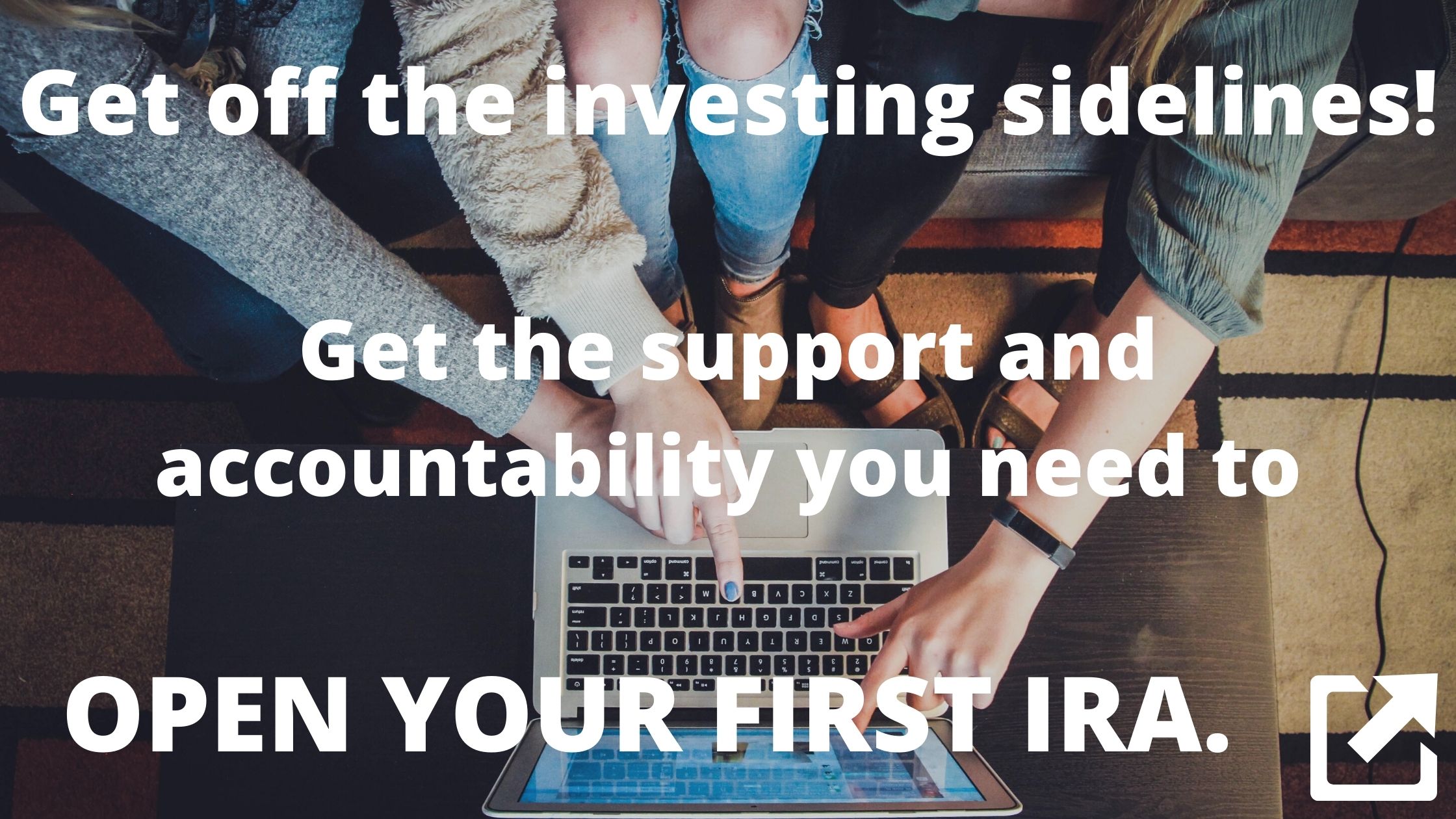
Additional Benefits of The Wealthy PhD Program
23:41 Emily: Is there anything else you wanted to add about your summer internship or about your experience with The Wealthy PhD?
23:48 Anonymous: I think I would like to just say that The Wealthy PhD program was a very valuable one. It was also not just getting over control, but it was the first time where I could speak freely about finances. I guess, depending on how you grew up or your culture kind of talking about how much you earn or how much money you have in your bank account can be an uncomfortable topic. So, having a safe space or like kind of a required space to be open about your finances and listen to other people’s ideas. That was really helpful for me to hear about how other people are dealing with their finances. I know that everybody’s situations are very different of course, but something that I learned that was really interesting to me was side hustling. So, I never thought about, I guess internship is a type of side hustling, but I never imagined anyone in their PhD doing extra work while they’re doing their PhD research. And during the program, I saw many, at least a couple people, who are doing really interesting side hustles. I think someone had a YouTube channel, which is amazing. I think somebody was an actual licensed therapist, which blew my mind. So, I think having this Community was really empowering for me.
25:11 Emily: I’m so happy to hear that. Yeah. It’s obviously something that I love to run. I love to be in. I love to provide support to these grad students and PhDs in this way. As you said, it’s really hard to find a space where you can openly talk about money. So, you have two challenges, right? First find a space where you can openly talk about money. Not too many of those. Secondly, find a space where people actually like can understand and sympathize with your situation of, “I only earn $30,000 a year.” Well, for you this year, that was different. But in a typical year, that would be the case. And, “Oh yeah, I really don’t have any potential for increasing my income on a fulltime basis until many years from now. Oh, and I’m also dealing with lingering, you know, debt issues and not having invested throughout all my twenties,” and all kinds of like unique to PhDs kinds of issues. So, I’m really pleased that I’ve been able to provide that space and that people like you have been taking advantage of it and we’ve been having such wonderful conversations. So, yep. I really appreciate that. Thank you.
Best Advice for Another Early-Career PhD
26:07 Emily: So, as we close out the interview, what is your best advice for another early-career PhD?
26:14 Anonymous: I would say I think just echoing what you just said. Try to start saving for retirement early. I, I think I had this mentality in my early PhD as well. But as PhD students, we mightfeel like we’re not earning enough money. So, we might think that, “Oh, I don’t have enough money for retirement. All my money’s gone after paying rent and food.” Or I think another thing is, “Oh, we’ll catch up once we get a real job. So, we’ll not save during our PhD years, but start afterwards.” But I think something that’s constantly being emphasized is the importance of time and compounding interests in investing. So, even if it’s very little, now that I’m back to my PhD stipend, I’m investing very little, but I’m still investing. As soon as my stipend comes in, I’m investing a certain amount of money to my Vanguard investment account. So, I think that that’s pretty important, no matter, regardless of what you think about how much money you have, where we can catch up afterwards. Just try to save for retirement early.
27:25 Emily: Yeah. You really only know what’s going on today. You don’t know what the future holds. You might stay in grad school longer than you expect to. You might do a five-year post doc. It may be a long, long time until you reach the point that you thought you would start investing. And as you said, with the power of compound interest, the time value of money, those years that go by could have been helping you a lot in terms of your investments. If you have, you know, the means and the willingness to start earlier, then it’s a wonderful idea. I just wanted to add in, actually, because you sort of briefly mentioned this earlier, but prior to 2020 people in your position, fellowship recipients, weren’t able to use IRAs, to contribute to IRAs. So, you could still invest, you could still invest for retirement.
28:06 Emily: It just couldn’t be inside a tax advantage retirement account. However, starting in 2020, that changed. So, your eligibility was different in 2020, not just because you did the internship, but also because your fellowship is now eligible to be contributed. So, I’ll link in the show notes to the podcast episodes that I have explaining that change as well. But it just happened at the end of 2019. So, some people are still not aware of the shift yet. So, yeah, if you have fellowship income in 2020, and you weren’t aware, yes, you can contribute that to an IRA. So, definitely think about doing that, or at least starting one, contribute a little bit before the end before tax day in April, 2021. So, thank you so much Anonymous for coming on the podcast and sharing about this internship experience of what it did for you financially. I found it fascinating. I found it really hopeful for people who maybe in other fields who could take advantage of an internship like this and have kind of a boon year like you did in the middle of grad school when it’s sorely needed.
29:04 Anonymous: Yeah. Thank you so much for having me.
Outtro
29:07 Emily: Listeners, thank you for joining me for this episode. Pfforphds.com/podcast is the hub for the Personal Finance for PhDs podcast. There, you can find links to all the episode show notes and a form to volunteer to be interviewed. I’d love for you to check it out and get more involved. If you’ve been enjoying the podcast, please consider joining my mailing list for my behind-the-scenes commentary about each episode. Register at pfforphds.com/subscribe. See you in the next episode! And remember, you don’t have to have a PhD to succeed with personal finance, but it helps. The music is Stages of Awakening by Podington Bear from the free music archive and is shared under CC by NC. Podcast editing and show notes creation by Meryem Ok.
